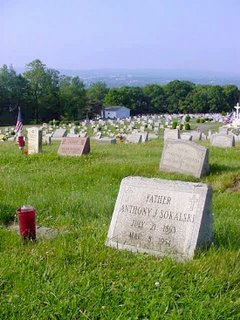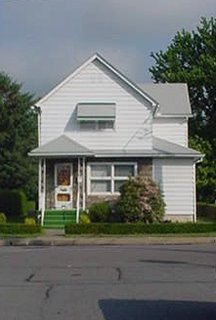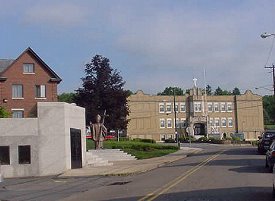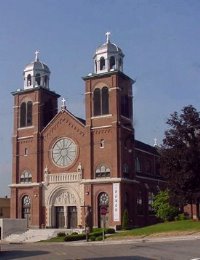
A HOME TOWN VISIT
The marker stands overlooking the Lackawanna Valley in a town called Dickson City. The Lackawanna river runs through the center of town. My birth place revisited; I had walked its streets seven decades ago. My reason or being there: my cousin Blanche had come in from Florida for the summer months. She had stayed with her son Jerry during the winter. I spent a very pleasant visit with them. While there, I drove up the steep Pancoast Street and stopped to pray. It was a peaceful scene where homes grace the hillside and people learned to walk the tilted walk. I looked down on the simple stone that said "Father" "Anthony J. Sokalski." Here lay a miner, a tough, black-lunged, callous-palmed man who worked for thirty years under the earth in blackened dim cavernous passages. Thirty years in back-breaking, persevering labor to support us. The depression had left him without a job at times; Balbina and I became migrant workers and picked beans and peas; cherries and apples; and, oh yes, blueberries for which we received 5 cents a quart. Thank God for Mothers like Balbina. I had a penny to search in the general stores of our treks to find the best candy I could. It took time. It was a serious decision.
Years later my father's legacy turned out to be black lung and premature death of coronary thrombosis. It was good that a man who spent more than half of his life in a treeless dark underground, now had a view of the earth from a mountain. He rolled his own cigarettes from Buglar tobacco, for in our norman existence, the store-bought ones were not within our means. We played two-handed pinochle occasionally and we used a crystal radio to hear sports broadcasts. I thanked him in my heart and hoped he was at the supreme peace that he so terribly deserved. I wished that I could have thanked him more when it counted.
 I passed by the the white house on the end of Maple Street; it's address still 525 Dewey Street. It was the place were Balbina kept house and pinched pennies and was a wonderful mother. She taught me to read from a book called "The Bible". The stories were great; the illustrations somewhat enigmatic. I still have visions of them stored somewhere in the back of my mind. Our street wasn't paved for the first few years of my life. Roosevelt and the WPA, solved that problem. Our house was open-porched like all good and respectable Pennsylvania abodes. I remembered the smell of True Age beer in the gin mills where the miners washed down the soot with hefty draughts. There stood the old silk mill where the women supplemented their husbands sparse income with long hours at the demanding work of the owners. "Sweat Shops"...I think that's what they called them. Some vestiges of the places I knew as a boy stood; others, like the bowling alley, supermarket, theater, and ice cream parlor were gone. So were the prices: ten cents for a movie with two cents tax and a nickle ice cream cone.
I passed by the the white house on the end of Maple Street; it's address still 525 Dewey Street. It was the place were Balbina kept house and pinched pennies and was a wonderful mother. She taught me to read from a book called "The Bible". The stories were great; the illustrations somewhat enigmatic. I still have visions of them stored somewhere in the back of my mind. Our street wasn't paved for the first few years of my life. Roosevelt and the WPA, solved that problem. Our house was open-porched like all good and respectable Pennsylvania abodes. I remembered the smell of True Age beer in the gin mills where the miners washed down the soot with hefty draughts. There stood the old silk mill where the women supplemented their husbands sparse income with long hours at the demanding work of the owners. "Sweat Shops"...I think that's what they called them. Some vestiges of the places I knew as a boy stood; others, like the bowling alley, supermarket, theater, and ice cream parlor were gone. So were the prices: ten cents for a movie with two cents tax and a nickle ice cream cone.My first job was at Tower's bowling alley where I worked for tips and a little old Lady called "The Turtle" creamed the ten pins so I had to quickly jump out of the pit. The space where we grew a Victory Garden was now treed and built upon. The sign for Polonia Park still stood at the curve in the road on Boulevard Avenue, where I biked to school.
 ST. MARY'S: DICKSON CITY, PENNSYLVANIA
ST. MARY'S: DICKSON CITY, PENNSYLVANIA
St. Mary's Visitation school, taught by the Bernadine Sisters. Sister Lauretane, God bless her soul, was a very patient eighth grade teacher. Some mornings I came in late for I had a mile to walk to school. The sight of neat tools at the Moscovitz hardware store and the smell of baked goods at the Shwatzkin's bakery on Main Street were to blame. Perhaps a slower walk past the house of the young lady that caught my fancy contributed to the tardy arrival as well. I saw in the corner of my eye where I had my first scrap as a boy during recess. I won the first grade battle against a bully and gained some respect. The mountains stood impervious to change except the scarred remnants of man's scratching their forests to retrieve that black gold that ran the steam engines that powered commerce. Blueberries still perennially covered the top of the mountain. I remember blueberry pies, and blueberry pancakes, and the wonderful blueberry and blackberry jellies with their wax-lined lids. The larder was always filled with the fruits of the earth in Bell jars, opened gratefully on cold winter days.
I won the first grade battle against a bully and gained some respect. The mountains stood impervious to change except the scarred remnants of man's scratching their forests to retrieve that black gold that ran the steam engines that powered commerce. Blueberries still perennially covered the top of the mountain. I remember blueberry pies, and blueberry pancakes, and the wonderful blueberry and blackberry jellies with their wax-lined lids. The larder was always filled with the fruits of the earth in Bell jars, opened gratefully on cold winter days.
The ice house along the train tracks was gone. It had supplied the "ice box" with its much needed cold on hot summer days.
The road home took me to another battlefield...this one not far from the border of Maryland: the Gettysburg Battlefield. I drove through the town, stopped at a gas station to inquire the exact location of the battle field. "Here.... right here," said an old bearded gent, "yer standin on it." I smiled, as he offered directions to the Visitor's Center. There were many offerings, multi-media presentations to depict that fateful and terrible day when the Union was in such peril.
There were many options: auto tours, walking tours, and bus tours: I took the cemetery tour with a park ranger called Don Johnson.  White bearded with crisp eyes and a narrative style that was saturated with the human pathos of a great battle.
White bearded with crisp eyes and a narrative style that was saturated with the human pathos of a great battle.  The bust of Lincoln looked down upon him as he traced the location of the dais where Lincoln uttered those inimitable words of the Gettysburg Address. Mr. Johnson detailed it with stories which made history a living, vital, dynamic thing. I listened careful like; photographed diligently, and videoed what could not be written or spoken, but needed to be seen in motion, for the Battle was certainly a thing of motion. I came back more grateful than when I left: cemeteries have a way of doing that.
The bust of Lincoln looked down upon him as he traced the location of the dais where Lincoln uttered those inimitable words of the Gettysburg Address. Mr. Johnson detailed it with stories which made history a living, vital, dynamic thing. I listened careful like; photographed diligently, and videoed what could not be written or spoken, but needed to be seen in motion, for the Battle was certainly a thing of motion. I came back more grateful than when I left: cemeteries have a way of doing that.

No comments:
Post a Comment